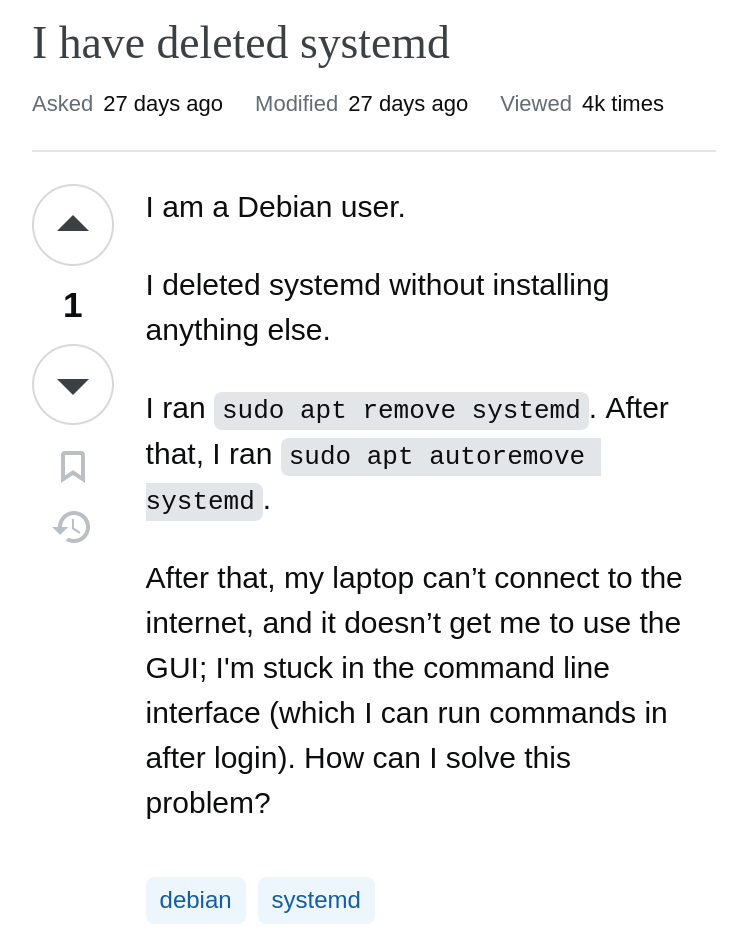this post was submitted on 19 Apr 2024
888 points (98.7% liked)
linuxmemes
26233 readers
1782 users here now
Hint: :q!
Sister communities:
Community rules (click to expand)
1. Follow the site-wide rules
- Instance-wide TOS: https://legal.lemmy.world/tos/
- Lemmy code of conduct: https://join-lemmy.org/docs/code_of_conduct.html
2. Be civil
- Understand the difference between a joke and an insult.
- Do not harrass or attack users for any reason. This includes using blanket terms, like "every user of thing".
- Don't get baited into back-and-forth insults. We are not animals.
- Leave remarks of "peasantry" to the PCMR community. If you dislike an OS/service/application, attack the thing you dislike, not the individuals who use it. Some people may not have a choice.
- Bigotry will not be tolerated.
3. Post Linux-related content
- Including Unix and BSD.
- Non-Linux content is acceptable as long as it makes a reference to Linux. For example, the poorly made mockery of
sudoin Windows. - No porn, no politics, no trolling or ragebaiting.
4. No recent reposts
- Everybody uses Arch btw, can't quit Vim, <loves/tolerates/hates> systemd, and wants to interject for a moment. You can stop now.
5. 🇬🇧 Language/язык/Sprache
- This is primarily an English-speaking community. 🇬🇧🇦🇺🇺🇸
- Comments written in other languages are allowed.
- The substance of a post should be comprehensible for people who only speak English.
- Titles and post bodies written in other languages will be allowed, but only as long as the above rule is observed.
6. (NEW!) Regarding public figures
We all have our opinions, and certain public figures can be divisive. Keep in mind that this is a community for memes and light-hearted fun, not for airing grievances or leveling accusations. - Keep discussions polite and free of disparagement.
- We are never in possession of all of the facts. Defamatory comments will not be tolerated.
- Discussions that get too heated will be locked and offending comments removed.
Please report posts and comments that break these rules!
Important: never execute code or follow advice that you don't understand or can't verify, especially here. The word of the day is credibility. This is a meme community -- even the most helpful comments might just be shitposts that can damage your system. Be aware, be smart, don't remove France.
founded 2 years ago
MODERATORS
you are viewing a single comment's thread
view the rest of the comments
view the rest of the comments

It's also "infectious" software. The way systemd positions itself on the system, it can make it more difficult for software to be written in an agnostic way. This isn't all software, and is often more of a complaint by lower level software, like desktop environments.
https://catfox.life/2024/01/05/systemd-through-the-eyes-of-a-musl-distribution-maintainer/ This isn't a terrible summary of some of the aspects of it.
Another aspect is that when it was first developed, the lead on the project was exceptionally hostile to anyone who didn't immediately agree that systemd definitely should take over most of the system, often criticizing people who pointed out bugs or questionable design decisions as being afraid of change or relics of the past.
It's more of a social reason, but if people feel like the developer of a tool they're forced to use doesn't even respect their concerns, they're going to start rejecting the tool.
What do you expect from an init system? It's like saying my cpu is infectious because my computer depends on it
I think the init system is the best part of systemd. It is sooo easy to use. You don't have to write the same complicated shell script for your software like everyone else. You just give systemd the path to your executable and that's basically it. It does the rest and you don't have to worry about PID files or forking the actual software. Systemd basically runs it like you did while developing it.
I think what people don't like are all the other parts of systemd that seem to be tightly coupled. I don't know if it is even possible to run just the systemd init without any other systemd package.
The last time I got angry at systemd was when resolvd did some DNS shit I did not approve of.
I may be wrong but I believe that all of the systemd programs are decoupled. You can run the systemd init system without any resolved or networkd. They just happen to be used by default on a lot of distros.